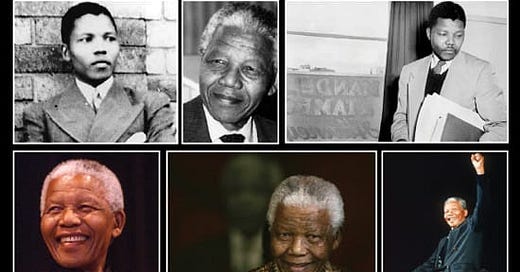Nelson Mandela International Day-2022
Nelson Mandela Day- the tagline for 2022: “Do what you can, with what you have, where you are.”
Nelson Mandela International Day
by The Ovi Team
18 July is the Nelson Mandela International Day, adopted in November 2009 by the UN General Assembly, as a tribute to the founding president of the post-apartheid South Africa and his contribution to the culture of peace and freedom.
The UN General Assembly adopted a resolution on Nov. 10, 2009 to commemorate every year starting in 2010 on July 18, Mandela's birthday, to recognise his contribution to resolving conflicts and promoting racial reconciliation and human rights. Mandela will commemorate his 92nd birthday on Sunday.
The elimination of apartheid was always high on the agenda of the United Nations. In the decades leading up to the advent of democracy, the world body would contribute to the global struggle against apartheid by drawing world attention to the inhumanity of the system, legitimising popular resistance, promoting anti-apartheid actions by governmental and non-governmental organisations, instituting an arms embargo, and supporting an oil embargo and boycotts of apartheid in many fields.
On Friday, July 16, an informal plenary meeting of the General Assembly was held in the General Assembly Hall. The event incorporated music, photos and video footage of Mr Mandela.
Nelson Mandela
In 2009, President Jacob Zuma first introduced the concept of Mandela Day to motivate a nationwide campaign to get the public involved in charitable activities. In November 2009, the General Assembly of the United Nations (UNGA) paid tribute to Dr Nelson Mandela by adopting a resolution to make the international community aware of his humanitarian work.
From 2010, 18 July was declared by the UNGA as International Nelson Mandela Day. This day also coincides with the icon’s birthday. The celebration of this international day recognises and gives credence to the former President Nelson Mandela’s commitment to human rights, conflict resolution and reconciliation.
Nelson Mandela Day not only celebrates Nelson Mandela’s life, but it is also a global call to action for people to recognize their ability to have a positive effect on others around them.
These values include democracy, freedom, equality, diversity, reconciliation, and respect. An international campaign has been initiated by the Nelson Mandela Foundation and the International Nelson Mandela Day, which sums up what Mandela stands for. It gives all people in South Africa and all over the world an opportunity to do something for others, for only 67 minutes in recognition of the 67 years that Madiba spent fighting against apartheid.Many people and organizations around the world take part in many activities to promote Nelson Mandela Day.
These activities include volunteering, sport, art, education, music and culture. Various events are also held on or around July 18 to honor Nelson Mandela’s works and to promote the different projects that were inspired by Mandela’s achievementsCabinet on 1st July 2009 endorsed the call to declare 18th July as global Mandela Day. In November 2009 the United Nations once again declared 18 July as Nelson Mandela International Day. All South African, civil society organisations and the citizens of the world supported the Mandela Day initiative by doing acts of good works in their communities.
South Africa's celebration
Every year on 18 July South Africans and the international community honour former President and international icon, the late Nelson Mandela through the Nelson Mandela International Day. This is an annual international day of humanitarian action in celebration of Nelson Mandela’s life and legacy. Also, it is a catalyst to encourage everyone to change the world through voluntary community work.
Throughout his lifetime, Nelson Mandela spent 67 year of his life advancing the struggle for the liberation of all South Africans, black and white, from political, social and economic division.
"During my lifetime I have dedicated myself to this struggle of the African people. I have fought against white domination, and I have fought against black domination. I have cherished the ideal of a democratic and free society in which all persons live together in harmony and with equal opportunities. It is an ideal which I hope to live for and to achieve. But if needs be, it is an ideal for which I am prepared to die."
Theme and messages
Global Climate Change was not seen as a serious, realistic threat for most South Africans. However, following the heavy rains which led to flooding which occurred during April this year in KwaZulu-Natal and parts of the Eastern Cape, the impact of global climate change is no longer a distant, future threat.
Following 435 recorded deaths, due to the flooding, with many more individuals still unaccounted for, entire communities left homeless, the overall social, socio-economic and other devastating effects; global climate change and its corporeal impact can no longer be ignored.
Added to that, South Africa remains the most unequal country in the world, with 10 percent of the population owning more than 80 percent of the wealth, according to a World Bank report. This socio-economic inequality in turn is obviated through food insecurity. Statistics South Africa reports that almost 23,6 per cent of South Africans in 2020 were affected by moderate to severe food insecurity, while almost 14,9% experienced severe food insecurity.
It is therefore critical to engage in activities that will mitigate the adverse effects of climate change as seen in KwaZulu-Natal and beyond, while highlighting the plight of food insecurity at a household level in South Africa.
In response, the Nelson Mandela Foundation believes that we should apply every effort facilitate lasting, sustainable solutions to counter the impact of global climate change and food insecurity.
The underlying values of the campaign remain the same as espoused by the tagline for 2022: “Do what you can, with what you have, where you are.” For the Nelson Mandela Foundation, the focus and messaging are be based on promoting community and backyard gardens, supporting fruit and indigenous tree planting, and creating awareness of the intersections between food security and climate change.




